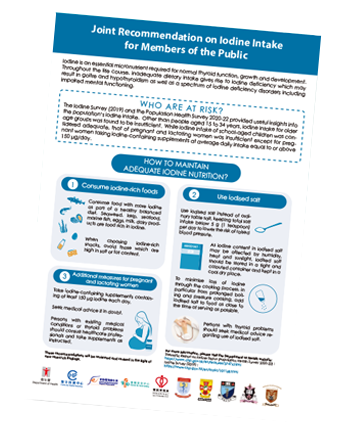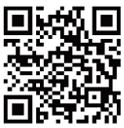


Department of Health

The Department of Health (DH) conducted the third Population Health Survey (PHS) 2020-22 among land-based non-institutional population aged 15 or above in Hong Kong (excluding foreign domestic helpers and visitors) to collect information on population health, which included, among others, assessing the use of iodised salt at home, consumption of iodine-rich food (including seaweed and ready-to-eat seaweed snack) and iodine-containing supplements, as well as undertaking biochemical testing of urinary iodine concentration (UIC) (μg/L) to assess the iodine status of the local population.
The survey found that the median UIC of persons aged 15 to 84 was 91.3 μg/L, and the median UIC for females (88.1 μg/L) was lower than that of males (93.7 μg/L) in this age group. According to the epidemiological criteria set by the World Health Organization, 100 to 199 μg/L for median UIC is classified as “adequate” iodine intake. In Hong Kong, iodine intake was “insufficient” with “mild iodine deficiency status” for persons aged 35 or above (median UIC of persons aged 35 to 54 and 55 to 84 was 92.7 μg/L and 79.8 μg/L respectively), while persons aged 15 to 34 were classified as having “adequate” iodine intake (the median UIC of persons aged 15 to 34 was 107.5 μg/L).
Iodised salt and iodine-rich food provide sources for maintaining adequate iodine nutrition. However, the survey findings showed that only 21% of the respondents used iodised salt at home and only 8.7% of them consumed seaweed at least once per week.
DH commissioned The Chinese University of Hong Kong to conduct a territory-wide Iodine Survey in 2019 to assess the iodine status of three vulnerable groups, namely school-aged children, pregnant women and lactating women in Hong Kong. The survey revealed that the iodine intake of school-aged children was considered “adequate”, while that of pregnant and lactating women was “insufficient” (except pregnant women taking iodine-containing supplements at an average daily intake equal to or above 150 μg).
DH and the Centre for Food Safety of the Food and Environmental Hygiene Department have jointly set up the Working Group on Prevention of Iodine Deficiency Disorders, which consists of representatives from the Hospital Authority, the Hong Kong College of Community Medicine, the Hong Kong College of Family Physicians, the Hong Kong College of Obstetricians and Gynaecologists, the Hong Kong College of Paediatricians, and the Hong Kong College of Physicians. After reviewing the key findings of PHS 2020-22 and the latest scientific evidence, the Working Group recommended that members of the public should increase iodine intake to maintain adequate iodine nutrition through consuming iodine-rich food and using iodised salt, and pregnant and lactating women were advised to take supplements containing at least 150 μg iodine each day. Please refer to the Joint Recommendation on Iodine Intake for Members of the Public for further details. For more information, please visit the website of the Centre for Health Protection of DH (https://www.chp.gov.hk/en/features/37474.html)。



